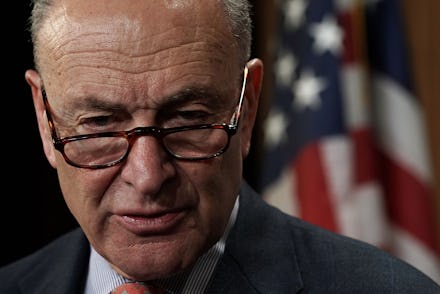Progressives in Congress reject top Democrats’ wish list for Trump’s North Korea summit

President Donald Trump faced significant criticism in 2017 for his hardline stance on North Korea — one he punctuated with personal insults against Kim Jong Un and threats to “totally destroy” the country.
“We need to be firm and deliberate with [North Korea], but reckless rhetoric is not a strategy to keep America safe,” Senate Minority Leader Chuck Schumer (D-N.Y.) tweeted in August, after Trump infamously threatened Pyongyang with “fire and fury.”
But Monday, a week before Trump’s historic summit with Kim, Schumer and other top Senate Democrats pushed the president to take a tough, all-or-nothing approach to his dealings with North Korea that critics say mirrored the most hawkish members of his administration — and revealed what appears to be a generational divide in the Democratic Party’s approach to global affairs.
“We’re stuck in an old way of thinking on foreign policy, and that letter reflected it,” Rep. Ro Khanna (D-Calif.) said in a phone interview. “That letter could have been written by John Bolton.”
In the letter, Schumer and the Senate Democrats said a successful agreement between Trump and Kim would force North Korea to “dismantle and remove” all of its nuclear, chemical and biological weapons; “permanently dismantle” its nuclear weapons infrastructure; suspend its ballistic missile tests and eliminate its ballistic missiles and programs; and commit to “robust compliance inspections.”
“Democrats will look to the standards outlined in this letter as we examine whether North Korea should be granted sanctions relief,” the Democrats wrote.
However, that hardline view “does not represent the new generation or new progressive [foreign policy] vision,” Khanna tweeted Thursday.
Khanna told Mic the letter sets forth “unrealistic” demands that constrain the U.S. and North Korea at the negotiating table and could hurt the delicate diplomacy South Korean President Moon Jae-in has crafted on the peninsula in recent months.
“The Democrats need to be unified in a vision encouraging diplomacy,” Khanna said. “The Senate should not be making a demand that North Korea needs to agree to complete denuclearization for there to be any concessions on our side.”
That sentiment appeared to be echoed by observers and foreign policy experts who, in recent interviews with Mic, described the letter as unnecessarily rigid.
“It was worse than useless, and it was irresponsible,” Richard Haass, president of the Council on Foreign Relations and Colin Powell’s former director of policy planning at the State Department, said in a phone interview. “[The letter] was a truly unrealistic and unhelpful intervention. ... It was totally consistent with what the national security adviser has been arguing.”
But Sen. Mark Warner (D-Va.), who cosigned Schumer’s letter to Trump, said it’s important for Democrats to hold the president accountable and ensure he doesn’t strike a “deal for a deal’s sake.”
“Any agreement with North Korea must denuclearize the Korean peninsula and be subject to strong congressional oversight,” Warner said in a statement to Mic.
Still, Khanna said a new generation of Democrats have a different foreign policy vision, one that shows “more restraint” in its military engagement but still promotes U.S. influence overseas through a greater focus on “soft” power. The 41-year-old progressive — who was elected to represent California’s 17th District in 2016 — suggested this new Democratic doctrine is partially a response to the “strategic blunder” of the Iraq War.
While then-President George W. Bush, a Republican, presided over the 2003 invasion of Iraq, a “lack of spine” by Democrats who failed to articulate an alternative vision allowed the war to happen, according to Khanna. Now, he said, Schumer and other top Democrats risk going down the same path with their hardline posture on North Korea.
“On foreign policy, [Schumer] is not articulating a clear distinction from the neoconservative view that has gotten us into this mess,” Khanna said.
Trump agreed in March to meet with Kim after a strong diplomatic push by South Korea ahead of the 2018 Winter Olympics. He canceled the meeting in May during an exchange of harsh rhetoric involving Bolton, his national security adviser, Vice President Mike Pence and a North Korean official, but announced a week later the summit would go on as scheduled.
He left for the Singapore summit Saturday, cutting short his attendance at a contentious G7 summit in Canada.
It’s unclear what will come from the highly anticipated meeting Tuesday, but Trump on Saturday appeared to cool expectations, expressing hope the summit could mark the beginning of a process toward denuclearization.
“The minimum would be relationship,” Trump said of his goals for the meeting. “You’d start at least a dialogue. I’d like to accomplish more than that, but at a minimum we’ll have met each other, seen each other. Hopefully we will have liked each other.”
Reports of Trump’s “unstructured” preparation process — along with his own statements — have raised concerns about how substantive the meeting will be. Trump said Thursday he didn’t “have to prepare very much” for the high-stakes summit because “it’s about attitude.”
Khanna expressed unease about Trump’s preparation level, along with the meeting taking place without more low-level diplomacy happening first.
But that’s no reason for Democrats to reject the talks, he added.
“That’s exactly what we’ve been criticizing Trump for,” Khanna said, noting Democrats slammed Trump for pulling out of the Iran nuclear deal. “People want engagement. They want diplomacy. [Schumer’s letter] doesn’t articulate a clear foreign policy position as a party, and it risks making another catastrophic mistake because we can’t count on the Democratic Party to put forth a strong vision.”
Correction: June 11, 2018